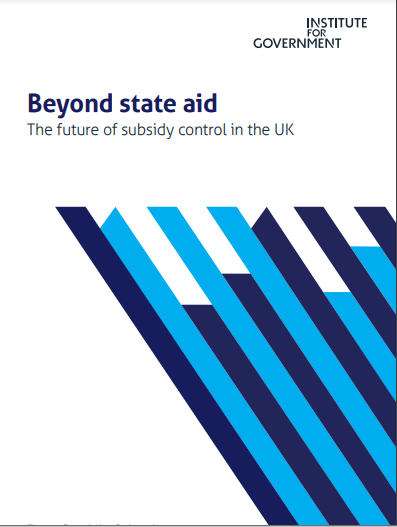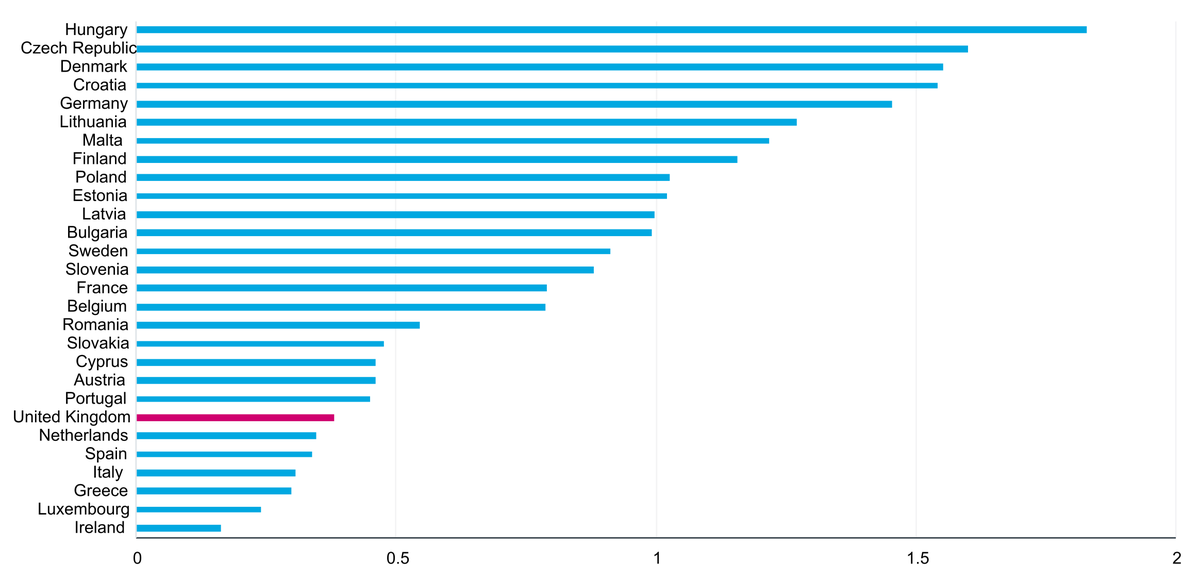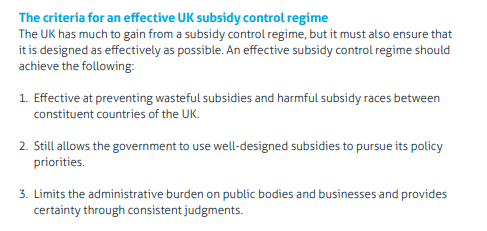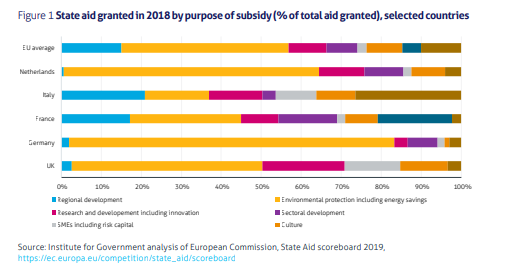Is state aid the Brexit hill the UK should die on? Today we publish our new @instituteforgov paper on subsidy control. We go through the arguments for what kind of subsidy system the UK should have and we outline why a compromise with the EU makes sense. Long thread (sorry) 1/
First some context. The UK is not a big subsidiser as the chart below shows. But that could change. Rumours about a new light touch regime to enable more subsidies of UK priorities have been reported - we get to the wisdom of this in a moment. 2/
Currently the UK is bound by two multilateral systems of subsidy control: the WTO Anti Subsidy and Countervailing Measures Agreement, and the EU& #39;s state aid. State aid is more comprehensive and more rigorously enforced 3/ https://www.instituteforgovernment.org.uk/explainers/world-trade-organization-subsidies">https://www.instituteforgovernment.org.uk/explainer...
Most states do not have a proper subsidy control regime. It is mostly federal regimes and other trade blocs that suffer due to multiple autonomous sources of spending. In the case of the US it has led to egregious subsidy races, where states compete to attract business 4/
So what should the UK adopt, if any? Ignoring for a moment the context of a deal with the EU, there are three options: a & #39;light touch regime& #39; reportedly favoured by Cummings, state aid more or less as is, or a hybrid. We set out some criteria to help judge below 5/
We argue that the light touch regime has little to recommend it. We don& #39;t get much extra flexibility because most government priorities are covered by existing exemptions even in the current system (Net zero, investing in tech, regional development). But it does risk a lot 6/
The light touch regime does not protect the UK from damaging subsidy races between different parts of the UK. The UK& #39;s quasi-federal system and poor constitutional mechanisms make a formal system highly desirable. In addition it would not guard against the risk of cronyism 7/
The best approach even ignoring the context of a deal is to have an independent regulator. It should take state aid as a baseline - most experts we interviewed found that there is little to be gained from starting from scratch apart from a wave of litigation. 8/
There are some flaws the UK should fix - cases can take 10 years to be resolved due to the speed of the general court. Some find problems with specific concepts that the case law of state has developed. We could also have a more permissive regime to exempt innocuous spending. 9/
But it needs to be able to have the confidence of the Devolveds and needs to have teeth. Over time the UK could develop differently, much like Australian law diverges from UK law now. We could call this the Australian option (the only way for any policy to be adopted by gov) 10/
If this is approach is the ideal, why is the negotiation in deep freeze over state aid? Well the EU& #39;s original position is overkill. They would like the regulator to be the Commission and they would like state aid law to govern the deal. The government should not accept this. 11/
But the UK& #39;s offer of relying on the ailing WTO system is also thin gruel. There are some possible resolutions that don& #39;t involve a fundamental loss of autonomy. As long as the deal is reciprocal, and does not involve EU law and institutions, the UK actually has a lot to gain 12/
The basic requirements will be to set up an independent system (which we think the UK should do anyway). There will be some haggling over the exact meaning of subsidy. But the UK should still be able to make changes that will improve the system without too much trouble. 13/
The test for whether a subsidy is caught should be much higher than it is now. So only big subsidies with the real potential to harm competition should be subject to the agreement. But this is a good thing for the UK. Remember we don& #39;t subsidise much in comparison to EU. 14/
Nothing here breaches the UK& #39;s autonomy. It should be able to provide most of the subsidy it wants to. It is regulated by a UK body, making decisions in the UK& #39;s interest. But it also gets a privileged means of addressing bad EU subsidies. 15/
The elephant in the room that has not been mentioned yet is the NI Protocol& #39;s state aid provisions. The gov is currently seeking to override its provisions with domestic legislation in its IM bill. We argue that there is a better approach to trying to resolve this 16/
The NI Protocol causes problems for the EU as well as the UK. It forces the Commission to make politically difficult decisions on GB subsidies. It also has to balance the interest of a non-member state against others. Is it going to reject a French subsidy cos it harms NI? 17/
A sustainable path to resolving this involves the UK setting up a system the EU can trust and allowing it to supersede the state aid bit of the Protocol. This is the best approach to addressing the problems it causes in the longer term. It looks hard to see now however. 18/
In sum then: the UK should adopt its own subsidy regime with an independent regulator. This will help it negotiate a deal. But it will also prevent cronyism and subsidy races within the UK. There is no real loss of sovereignty and no real advantage to the alternatives ends/
Final note, this paper could not have been written without the insights of @jamesrwebber, @GeorgePeretzQC, @StateAidLaw, Andrea Biondi and many others. Though mistakes are ours. They don& #39;t all agree on everything but there is a surprising amount of consensus on the core points.

 Read on Twitter
Read on Twitter





